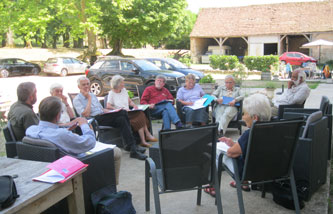 .
. 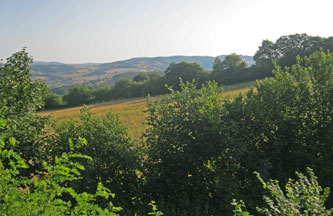
The Triglav Circle; view from my window of the Morvan Regional Park
On 29 June-1 July I attended the Triglav Circle meeting at the Chateau de Poussignol in the Morvan Regional Park in the Nievre Department of central France. The Triglav Circle was founded in 1996 after the UN Social Summit in Copenhagen to discuss the spiritual and ethical dimensions of public policies. Today it seeks to enrich the public discourse on global problems, encouraging political concern, social engagement and cultural sensitivity. A small but high level group from different fields spent a day and a half discussing the theme “Science, Technology and the Human Spirit”. A report on last year’s meeting, also at Poussignol, is at https://iefworld.org/node/885, with more pictures of the chateau and the region here.
 .
. 
The Triglav Circle; view from my window of the Morvan Regional Park
Participants included the founders of the Triglav Circle, Jacques Baudot (former senior UN official and coordinator of the 1995 Copenhagen Social Summit) and Barbara Baudot; Konrad Raiser, the former General Secretary of the World Council of Churches, and his wife Elisabeth; Geneviève Jacques, retiring president of CIMADE, a French association to help foreigners in difficulty; Marie-Aimée Latournerie, jurist and member of the French Council of State, author of a report on social inequality; Kishore Mandhyan, former Political Director for peacekeeping, humanitarian and human rights affairs at the United Nations; Simone Rignault, with a long political career as a Deputy, Regional Councillor and Mayor in France; and several others.
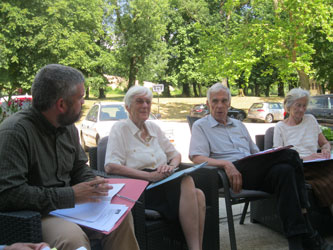 .
. 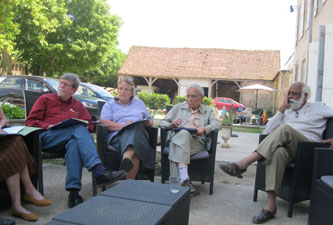 .
. 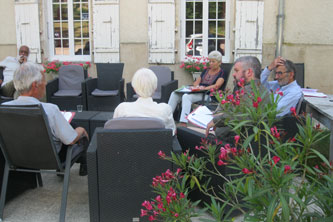
I prepared a paper for the meeting, “Reflections on Science, Technology and the Human Spirit,” that provided the background for many of my contributions, and will eventually be published on the Triglav Circle web site. It can be seen on the IEF web site.
The meeting started with viewing a video documentary on the life of Carl Friedrich von Weizsäcker (1912-2007) made and presented by his daughter Elisabeth Raiser. His early fearful memories of the First World War, and efforts to find a reflection of God in the stars, and later in the laws of physics after meeting Werner Heisenberg when he was 14, led him to fundamental discoveries in quantum physics, nuclear fusion and planetary formation in the early Solar System. He was then drawn into the efforts in Germany under the Third Reich to understand if a nuclear bomb was practical, before succeeding in convincing the government that it would take years to develop and that they should drop the idea. The moral dilemma this represented between his theoretical research and its applications, and failed efforts with Heisenberg to convince the Americans through Neils Bohr also to drop research on nuclear weapons, showed him the limits that scientists had over the use of their own discoveries and led him to take strong anti-nuclear positions and warn of environmental degradation after the war. The video was a powerful evocation of the ethical challenges presented by science and technology.
Situation of scientists in today’s world
The discussion then revolved around the situation of scientists in today’s world. Scientific discoveries are accelerating change, but we do not foresee the consequences. Researchers often do not consider the ethics of their own work in science and technology. For example, what are the implications of Artificial Intelligence for human society? In science, there is no sense of humility before something that is greater than we are.
The paradigm in the natural sciences has been their objectivity, and they have not addressed ethical considerations, while the social sciences explore relationships within communities involving ethical concerns. However, as science becomes more collaborative, these distinctions are diminishing, as illustrated by the recent merger of the International Council for Science and the International Social Science Council into a single global body for all of the sciences. The mechanistic Cartesian view of science is also challenged by quantum theory.
Today, many scientists find themselves in authoritarian structures or large corporations where they have little choice of the subjects they work on or the uses that are made of their discoveries. The scientific landscape has changed, with ”pure” science in retreat, and financial patronage becoming all-important. Whose money is invested? For whose agenda? Whose intellectual property? Who owns the applications? The public character of scientific knowledge, with science seen as a public good, is increasingly replaced by corporate research protected as intellectual property. Artificial intelligence is being pursued for corporate profit, but where are reflections on its impacts taking place? The growing proportion of private funding for science is not looking after the public interest, or whether its uses are good or bad.
The legitimacy and integrity of science are today under threat. There is growing scepticism of elite knowledge and the scientists’ “agenda”, with science discredited as representing special interests. People see science leading to long-term destructive effects on the environment and the lack of sustainability. The concept of the environment itself separates humanity from nature, and the conservation movement separates nature from us, with only the ecologists still seeing a whole. The European Enlightenment has misled us into patterns of thinking that need to be replaced by a new more holistic enlightenment. Support for the social sciences is being cut in many countries for political reasons because they raise too many questions. We may be entering a new dark age.
Technologies and transcendental ideals
A second theme was on technological “progress” and transcendental ideals. Technologies give us new liberties, but they are also a leveller of culture and philosophies. It can be hard to find transcendent ideals. Political groups may practice meditation without it leading to good character. Some technologies oblige you to pursue goals you do not want, driven by commercial interests, or by hidden or overt purposes and goals. There are also differences in transcendent goals across different groups. Technology is now another tool to exclude people from access to their rights, as when migrants must make applications on line but do not have access to the Internet. In discussing the Sustainable Development Goals, should people have a right to technologies, or do we need a way to limit technologies? Transcendent ideals include human dignity and social justice. How do you get to justice without love and concern for others? Individual freedom is too often linked to neoliberal competition. The French ideals of liberty, equality and fraternity need to be taken together. These ideals need to be strengthened against the new totalitarianisms and forms of power that can come with technologies.
Another discussion revolved around sources of knowledge. Science is one obvious source, but what about spiritual insights, beyond seeing, experiencing and feeling? Nature is more than the natural sciences. Knowledge can also come from the humanities if they are not diminished by reductionist language. The German term wahrnemung (perception) literally means to take in the truth, a form of knowledge beyond investigation, close to insight or intuition, seeing and receiving the truth with an inner cohesion and wholeness, that has no English equivalent. This led to a discussion of religion as a second knowledge system complementary to science, touching on justice, peace and the integrity of the creation. Religion is the most elementary form of wahrnemung, an encounter with the whole. All religions point to this experience as the source of life and being, and give it shape to communicate it through symbols and rituals. The sequence of religious revelations build on this experience, until they become exclusive and competitive. What we need today is to build a new culture of values instead of valuing culture.
This report can also be seen on the IEF web site.
Return to travel 2018 page - Return to personal home page
Last updated 8 July 2018
Photographs copyright © Arthur Lyon Dahl 2018